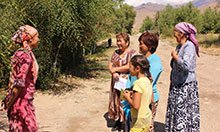Lessons in Handwashing Improve Young Students’ Hygiene Practices

Hygiene Lessons for Thousands
In the Kyrgyz Republic, most children spend long hours at school where bacteria and other infections can be easily transmitted through hand contact and unhygienic food practices. Poor hygiene can lead to diarrhea and other health problems that make it difficult to absorb nutrients that children need to meet their full growth and cognitive potential. To illustrate correct hygiene behaviors, SPRING/Kyrgyz Republic developed tools, messages, and materials on handwashing that are used in classrooms to reach tens of thousands of school-aged children.
SPRING delivers important nutrition-related messages through a network of community activists, or volunteers, who conduct home visits and group meetings in rural communities. At the national level, SPRING works with the Republican Center for Health Promotion (RCHP), part of the Ministry of Health (MOH), which oversees and directs local health promotion activities across the country. In September 2016, RCHP health promoters began using SPRING materials to teach hygiene classes in Jalalabad and Naryn oblasts to first- through fourth-graders who range from 6 to 10 years of age.
The curriculum, which incorporates colorful photos and posters to engage younger audiences, encourages schoolchildren to develop healthy behaviors and improve hygiene habits. By the end of 2016, health promoters in Jalalabad oblast had reached 17,836 school-aged children; in the first three months of 2017, they have already reached 8,747 schoolchildren in Naryn oblast.
In our school, most of the children wash their hands without using soap. At hygiene classes, my classmates and I learned the importance of handwashing with soap for at least 20 seconds at five critical moments to protect ourselves from infections.
--Aruuke Abduraimova, age 9, student from Jalalabad city
Handwashing Lyrics in Kyrgyz
БИР, ЭКИ, ҮЧ! Ден-соолук - бул күч,
ҮЧ, ТӨРТ, БЕШ! Көңүлүм да беш,
АЛТЫ, ЖЕТИ, СЕГИЗ! Кол жууйбуз тегиз,
СЕГИЗ, ТОГУЗ, ОН! Ден-соолукта болгон оң!
English Version
ONE. TWO, THREE! Health is strength,
THREE, FOUR, FIVE! My mood is five,
SIX, SEVEN, EIGHT! Washing hands is great,
EIGHT, NINE, TEN! Being healthy is fun!
Beating Helminth Infections
Helminth infections, which are primarily caused by poor hygiene practices, introduce parasites to the intestine, which then compete for the nutrients in the food a child eats. This lack of nutrient absorption can have a long-term impact on children’s physical and cognitive development. Although the MOH in Kyrgyz Republic recognizes that helminth infection is a serious problem, the extent of it is unknown. A 2009 UNICEF regional survey indicates a 41 percent prevalence of helminth infection among school children in Osh; in Batken, three out of four children are infected.
Aruuke Abduraimova, age 9, is one of the schoolchildren who attended a hygiene class in Jalalabad City. Health promoters taught Aruuke and her peers to always wash their hands with soap to prevent the spread of diseases and infections, such as diarrhea, flu, and intestinal worms. The promoters also highlighted the five critical times for handwashing: after using the latrine, after changing a baby’s diaper, before preparing food, before eating, and after coming into contact with animals.
During the hour-long hygiene class, promoters discussed the reasons for handwashing and conducted participatory demonstrations of appropriate handwashing methods with soap. To help kids wash their hands for the recommended time, SPRING composed several 20-second songs for students to sing while washing their hands. The songs are fun timing tools that reinforce how handwashing keeps students healthy.
Health promoters also distributed SPRING’s handwashing and clean latrine leaflets for children to take home. Aruuke said that after the hygiene class, she shared what she had learned by talking with her friends and family members. Aruuke and other schoolchildren have become agents of change in their communities, helping to shift social norms to improve nutrition. SPRING is collaborating with RCHP to encourage the delivery of these hygiene classes in other areas to reach thousands more Kyrgyz children.
